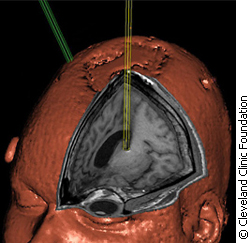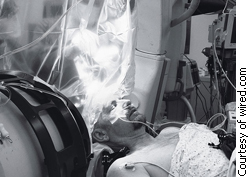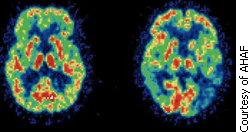
|
They were studying the effects of a process called deep brain stimulation (DBS) on a man with an overeating problem. "Well, it was a eureka moment, because we were looking for an effect on appetite… We knew it was very significant immediately. Because whenever you find something unexpected, you're not biased. And so it tells you that you're onto something that's probably quite real, and quite significant," says Dr. Andres Lozano, the lead researcher of the study published by the Annals of Neurology. Deep brain stimulation According to Dr. Elena Moro, assistant professor of neurology at the University of Toronto, the surgical process of DBS involves inserting electrodes into the brain. These electrodes are then connected to a medical device called a brain pacemaker that is inserted into the chest. This pacemaker sends electrical impulses to abnormalities in specific parts of the brain in order to normalize them. "Over the past twenty years, DBS has shown remarkable benefits for disorders like seizures, obsessive-compulsive disorder, Parkinson's disease and depression," says Moro, who added that an increasing number of researchers around the world are exploring whether DBS can be further used to treat a broader range of brain disorders. Recall moment
In the study, researchers were using DBS to try and reverse long-standing obesity in a 50-year-old man. Their intent was to suppress the man’s appetite by electrically stimulating nerve cells located in the brain which cause the release of appetite suppressant hormones. They had hoped that they could provoke a sustained loss of appetite. According to the study, while the researchers were sending electrodes to the appetite suppressant sites in his hypothalamus, he began to have a detailed memory of an event he had forgotten about that took place over thirty years ago. As the researchers increased the intensity of the electrical stimulus, the details of the man's memory became more vivid. Currently the Toronto team is testing their initial findings with a new study. They have implanted the DBS device into six patients with Alzheimer’s disease, testing to see if the memories locked away by the disease could be retrieved. The research is in its preliminary stages but scientists have already seen some indications of memory improvement.
“It is a very effective treatment for the motor problems associated with Parkinson’s disease and it has been used on 40,000 people. We are in the early stages of using it with Alzheimer’s patients and we don’t know if it will work. We want to assess if we can reach the memory circuits and drive improvement. It is a novel approach to dealing with this problem,” says Lozano. The trouble with memory This research seems promising, but to date it has only been tested on one person. Other researchers believe further tests need to be done to assess the validity of this discovery. “It is important to remember that there was nothing especially wrong with this patient's memory. As in all of us, memories lie buried that might never be recalled under normal circumstances,” says Dr. Jack Diamond, the Scientific Director of the Alzheimer Society of Canada. According to Diamond, the problem with this procedure is that for memory disorders like Alzheimer's, scientists are dealing with a significant loss of nerve cells — certainly more than would be found in an elderly person without dementia. This makes finding a cure a complex issue. “So the key question is have the long-term memories gone because brain cells critical to the storage of those memories have gone? Or, is the problem that the memories are still there, but cannot be accessed because critical connections have been lost when other cells died?” asked Diamond.
Moro is also critical of this new study, emphasizing that while DBS has been successful for other diseases, they have all been illnesses that take place in specific areas of the brain — memory loss seems to occur across many combined areas. "I don't think they will find a cure for Alzheimer's using DBS. This is really something that we don't know how it works. Its very foggy and we should wait for more research before we say that I is actually useful for memory," says Moro. In the end researchers and critics agree that the most important element of this, and any memory research, is that it could potentially help the thousands of families across the nation affected by Alzheimer’s.
|
|
|


